Free school for autistic children
- Published
- comments
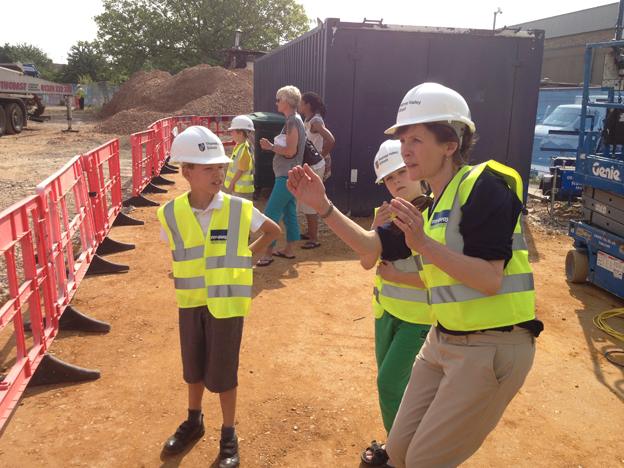
On the site of a former comprehensive in Reading, a new school is being built to cater for five- to 19-year-olds on the autistic spectrum. The Thames Valley School is one of the new breed of free schools in England set up to fill a local need.
Due to open next month, the school's head teacher, Fiona Veitch, is already hard at work - even though it isn't fully built.
Received wisdom in recent years has told us that mainstreaming disabled children is the best way forward. But Veitch says although regular state schools have tried hard, a specialist environment is needed to bring out the best in some pupils on the autistic spectrum.
"Many of the children we have have been permanently excluded from one or two schools or are on really reduced timetables and go into school for an hour or two a day, so that's why it's so important we get this right.
"A lot of the children are not just a bit bright, they're very bright. But because autism gets in the way, that impacts upon their behaviour."
With autism, people can have a unique ability to concentrate and learn things that others find repetitive or mundane. Recently Vodafone and software company SAP made headlines when they announced they were to recruit people on the autism spectrum to capitalise on these desirable attributes.
"I've got a pupil coming to us who's absolutely the most knowledgeable young man in the world about pumps and all forms of plumbing - he's eight. This boy can explain ventilation, how an extractor fan is put together, how it works, he can talk to you about his plumbing system, and I believe advises plumbers on how to fix things when they are called to his home."
Veitch is keen to use these obsessions - or "specialist interests" as she prefers to call them - to give the children a vocation and help them learn.
"We have a child who finds ponds really interesting and really calming," she says. "We will use that to teach him maths in terms of 'How big is the pond going to be?' Or 'How much water do we need to put in it?'"
The learning environment is built around the children, rather than expecting them to slot into a one-size-fits-all school.
Children on the spectrum find it difficult to process information fed to them by their senses. So, in an average classroom for instance, they may not know what sounds to prioritise: chatter, ticking clocks, birdsong, banging, air conditioning or the teacher's voice. It all comes through at the same intensity, as do smells and visuals.
As well as tailoring learning to the individual, the building and interior design helps dampen sensory information. When finished, it will have non-flickery lighting, muted colours and surfaces that aren't shiny or bright.
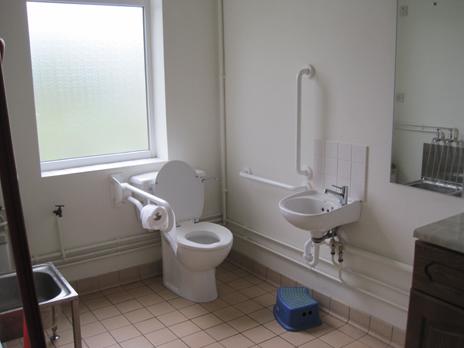
How neurotypicals see a school bathroom...
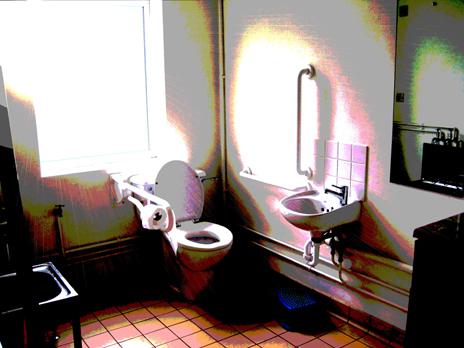
... and what the autism spectrum view might be.
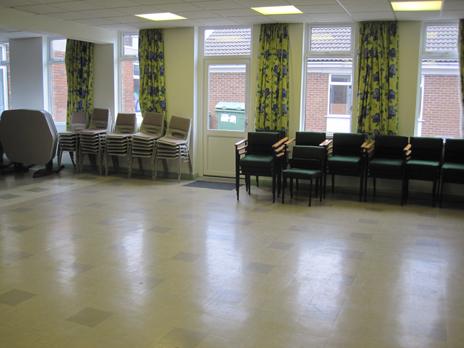
Ditto a hall...
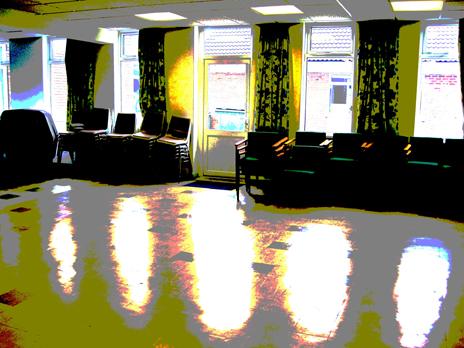
... and a depiction of what people on the autistic spectrum may experience.
Images created by Ann Memmott, a governor of the school who is a buildings surveyor and is herself on the spectrum. These were used to help with the design of the school. She is also an adviser to the All Party Parliamentary Group for Autism.

The ready-prepared building blocks of the school were created off-site and arrived a month ago. Construction has been underway since then, with the ambitious target of opening on 16 September.
With advice, Veitch has worked with an architect to design the school to be autism-friendly, and spends long hours each day making sure it's the best they can achieve.
"I've got an office on the building site. It's really important because it means I can see exactly what the builders are doing, that they understand what they're doing and why they're doing it," says Veitch, who has 24 years of experience in the field and has a son on the autistic spectrum.
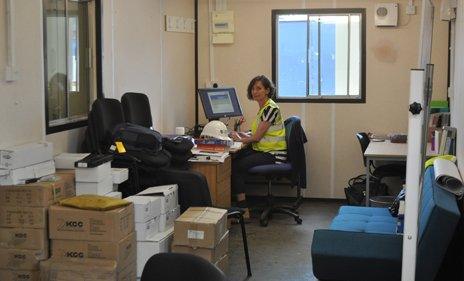
Veitch's office includes a sofa bed
The accessible additions to this school include a small room adjoining each classroom so children struggling with noise levels or other aspects of an overwhelming environment can work away from everyone else. The school also has "calming pods" - snugs with curved walls where light, noise and human input is very much reduced.
"The pods are a little bit bigger than I wanted them to be," says Veitch. So she consulted the site manager on how to lower the ceilings. "It will give a more enclosed feeling for children who need it at certain times during the day."
The children won't be educated in complete isolation from non-disabled children. Thames Valley School intend to share resources and invite mainstream pupils to after-school clubs. Some pupils will also attend classes at other schools.
Funded centrally by the government, when the school opens, it will have 18 pupils - all of whom are at the more able end of the spectrum. As it grows, it will also provide a small number of places for those with more complex needs.
But of those 18 children, only two will be girls. Why the gender imbalance?
"When I worked in Kent, I had a psychologist colleague who would always say 'basically autism is extreme maleness'." Laughing at this thought, Veitch says it was a "wicked generalisation".
It's now well-known that a fascination for the stereotypically male domains of computing, engineering and maths can be indicators of autism. This has led to many more men and boys being diagnosed.
"What we're finding now is that actually there might be a lot more girls out there, but the ways in which autism manifests itself is very, very different to how it manifests itself in boys.
"Girls might get more lost in stories about princesses and fairies and that kind of imaginative world and find it more difficult to come out of that world, whereas a boy on the spectrum might be get lost in the details of things like putting cars in a line." She stresses again that these are generalisations.
One of her female pupils is currently interested in flowers, especially roses, so they plan to create a rose garden at the front of the school, and she will choose what goes in it.
The aim for Veitch and her staff of teachers, mentors, assistants, psychologists and occupational therapists is to help pupils meet the national expectation of five GCSEs or more whilst also providing strategies to cope with their autism.
"These children, some of them don't feel they belong anywhere. So what we're trying to do is provide somewhere that really is theirs," says Veitch.
You can follow Ouch on Twitter, external and on Facebook, external, and listen to our monthly talk show